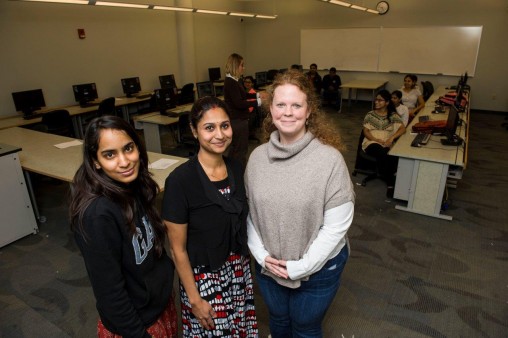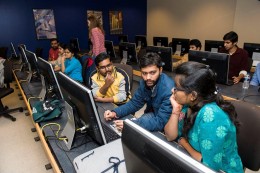
From left, engineering student Viharika Chalasani, module program Director Swapna Nair and Rachel Gonzales, adviser in computer science and engineering. (Photos by Erin Pence)
When they first arrive at Wright State’s College of Engineering and Computer Science, many international students face challenges other students usually never encounter.
Coming from a wide variety of educational systems and with English often being their second language, the students must learn to communicate effectively with their instructors, adapt to different teaching styles, meet varying academic expectations and connect both academically and socially with fellow students.
As a result, the college has developed International Graduate Acculturation Modules to familiarize graduate engineering and computer science students with academic and social expectations, rules and resources.
“Wright State’s vision calls for us to be known and admired for our inclusive culture with a commitment to achieving a campus environment in which all are free to make their contribution,” said Swapna Nair, who directs the program. “Recognizing and addressing the academic, social and administrative challenges facing our international students – who are here in large, unprecedented numbers – is vital to this vision.”
An integral part of the acculturation modules during their conception and development was Mike Raymer, who at the time was the college’s associate dean of research and graduate studies.
“The college enthusiastically has gone the extra mile to expand international understanding, to develop curriculum and to provide invaluable service to our students and campus,” said Raymer.

Acculturation module
The first series of modules were presented in 2014 and were attended by new international graduate students. More than 500 students have since taken the modules, and 135 are enrolled this semester.
There is a module on ethics, spelling out U.S. academic standards and expectations; one on career development that covers resumes, campus jobs, internships, and interviewing skills; one on post-graduate job and research opportunities; one on professional communication and problem-solving.
In addition, the college invited LEAP (Learning English for Academic and Professional Purposes), the intensive English program in the College of Liberal Arts, to develop a module, creating a dynamic partnership between the two colleges.
The module has extended the reach of LEAP, which provides full-time English instruction and helps non-native speakers develop the linguistic, academic and social skills they need to be successful.
“It is a way to empower their students and get them to transition into the U.S. academic culture,” said LEAP Director Jeannette Horwitz. “They have the language, but they may not fully understand the academic culture.”
LEAP created a module on academic success strategies. The students learn classroom etiquette, how to work in teams, how to write research papers and avoid plagiarism.
Catherine Crowley, assistant director of LEAP, said the students are given real-world problems to solve as teams, using techniques they learn in the modules.
“They solve problems with their engineering knowledge, and they learn how to support that with the research,” Crowley said.
Said student Viharika Chalasani: “Working in a group, presenting ideas in a thoughtful manner, using the available resources and giving credit to the work by citations is something that every student should learn.”
“Working together as a team was a nice experience,” added Sunil Sanaka. “They educated us about different resources available at WSU. We got hands-on experience on how to cite the source. We also got an idea on how to make an effective presentation.”

 Milling around
Milling around  Wright State recognizes Nursing Professor Kim Ringo for advancing international student success
Wright State recognizes Nursing Professor Kim Ringo for advancing international student success  Wright State honors graduating students for distinguished doctoral dissertations
Wright State honors graduating students for distinguished doctoral dissertations  Top 10 Newsroom videos of 2025
Top 10 Newsroom videos of 2025  Museum-quality replica of historic Hawthorn Hill donated to Wright State
Museum-quality replica of historic Hawthorn Hill donated to Wright State 